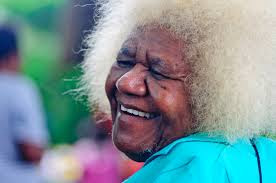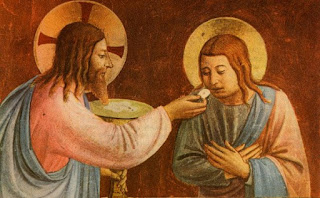Sunday, March 13, 2022
1.
So Sarah’s laughing. At God? Perhaps. At the very thought of conceiving? Maybe. At the hope surging in her bowels in that very moment? Possibly. And this has to be one of the loveliest moments, then, in all of scripture. And one of the strangest too. When God shows up at Sarah’s place, at Abraham’s place, at their modest tent by the oak grove of Mamre. When God shows up in the guise of a trio of travelers, talk about a trinitarian moment. God shows up at their tent as not one, but three pilgrims seeking shelter together, from the searing heat of a summer’s day.
And inexplicably, God lets this news slip. Not right away, of course. But after their feet are washed, and after they’ve rested awhile, and after they’ve feasted in the shady place. God lets this news slip. Just casually. Sarah’s going to have a child. Which means Abraham and Sarah are going to have a child together. Which means that these two very old believers – who imagined that those days were well, well past – these two very old believers are going to make a baby. Together.
Now they’ve been on the road a long time. Abraham’s maybe a hundred. Sarah’s pushing 90. They have loved their lives. And they have answered the call. But the world has a way of wearing you down. So she laughs. Of course, she laughs. Listening from her tent. Hearing this suggestion, this opening, no, this promise. Maybe she’s embarrassed. Maybe she’s incredulous. Or maybe she’s just plain stunned by the hope that stirs now in her heart, in her skin, in her spirit, in her soul. “I will surely return to you this time next year,” says the pilgrim by the fire, “and Sarah will then have a child.” Of course, she laughs.
And even that’s not the end of it.
God says to Abraham: “What’s up with that? Why’s she laughing? Is anything too extraordinary for the Holy One?” And Sarah – maybe bewildered and justifiably flustered – says: “I did not laugh.” And isn’t this the best part? The back and forth? The banter? And God says: “Oh, but you did! You did laugh! I caught you!” I don’t think God’s disappointed in Sarah. Far from it! I think God’s moved by her bewilderment. I think God’s drawn to her incredulity. God needs Sarah. Sarah needs God. Hope is a partnership that begins with an extraordinary promise and matures with extraordinary love.
2.
So let’s talk about that, friends. Let’s talk about hope.
Our mission, says Victoria Stafford to the church: “Our mission is to plant ourselves at the gates of hope.” This is an insight, friends, I want us to hear, I want us to own this morning. In this very place. “Our mission is to plant ourselves at the gates of hope—not the prudent gates of Optimism, nor the stalwart, boring gates of Common Sense, nor the strident gates of Self Righteousness—but the place of truth-telling, the place of resistance and defiance, the piece of ground from which you see the world both as it is and as it could be, as it might be, as it will be…”
And if our mission is to plant ourselves there, at the gates of hope, we may well be—like Sarah and Abraham, like Mary and Jesus, like Desmond Tutu and the Dalai Lama—we may well be stunned sometimes by its surging in our bowels, embarrassed by its inconceivability, moved to tears (or laughter) by its beauty and its resilience. This is not a reasonable faith: it’s a gospel faith. And it aims to break our hearts, our lives, even our churches, our sanctuaries, our sacred spaces wide open. The world as it is, yes…and as it could be, as it might be, as it will be. This God aims to break our hearts wide open.
And that’s what happens, I think, around a table like this one, a table where lost sheep come home to rest, a table where broken loaves fill hungry hearts, a table where divine mercy meets human weariness and awakens visions of justice and peace. When we take the bread of this loaf, the body of this Christ, in our hands, when we share it among siblings and offer it to one another, we risk seeing the world through God’s eyes. We risk imagining the world as it could be, as it might be, as it will be. And for all this, we may well be embarrassed from time to time, like Sarah. And we may well be moved to tears from time to time, like Jesus.
This sacrament, after all, is not a simple transaction: where you eat a little bread, and you get a little saved, or you take a little bite, and you fend off the wolves for a few days. No, it’s so much more than that. It’s a commitment to transformation, this sacrament, yours and ours. Or better yet, it’s a willingness to be transformed, or even a great surrender to the transforming power, the transforming love of Jesus Christ. That love is already at work in you; it’s already at work in us, in the church. Take this bread in your hand. Give thanks to God for the soil and the sun, for the seed and the harvest. Eat this bread with us and become the Body of Christ. And you may well be stunned by the surging of hope in your bowels, and by the holy ground we inhabit together, and by the gift of life itself. And here’s the best part. We may well be stunned together.
I love this feature in the story this morning, where God comes to Abraham and Sarah, and to their tent by the oak grove, as three travelers together, as a community of pilgrims. Hope is a collaborative project. Hope is a communion of energies and prayers, a communion of perspectives and passions. The thing is, you don’t have to generate hope all by yourself. And to be honest, it’s just about impossible to do that these days anyway. We are in this together. This gospel project. And God is our tireless and loving partner, our devoted friend and companion on the way. If only we have eyes to see.
And it’s no coincidence, I think, that the shocking, bewildering good news of Sarah’s pregnancy—which is linked in the Hebrew Bible to the continuing story of God’s blessing in all the world—it’s no coincidence that it’s revealed in the midst of a feast, at a moment of shared abundance and delight, as fires are lit and bread is broken and plates are passed and stories are told. So often, in scripture as in life, hospitality is the setting for joy and divine revelation; hospitality is the language of good news and blessing. In so many ways, hospitality liberates hope. Manifests hope. God’s intention.
So keep that in mind as you stand to receive communion, as you move toward a server this morning, as you take this bread in your hands, in your hearts, into your lives again. Now it’s pretty cozy in here, so you’ll be shoulder to shoulder with friends and fellow-travelers. I want you to make eye contact. This is not a private affair. This is not a transactional moment. Make eye contact, offer a blessing of peace as you do. Surrender to the transforming love of Jesus Christ—which is now, always has been, and will be forever at work in you. Surrender to that love and to that peace.
“The very least you can do in your life,” writes Barbara Kingsolver in her novel “Animal Dreams”—“The very least you can do in your life is to figure out what you hope for. And the most you can do is live inside that hope. Not admire it from a distance, but live right in it, under its roof.” Friends, I have to believe this morning that Sarah laughs because she’s living inside the hope now, because she’s been drawn into the shelter of hope now, because hope is her destiny, her future, her calling now. It’s a wild place to be. Sometimes even unnerving and a little embarrassing. But it’s her calling. And it’s our calling too.
Like ours, Sarah’s is a world at war. Like ours, hers is a divided world of haves and have-nots. Like ours, hers is a world of cynicism and despair. But that little community by the oak grove has renewed her faith. That little community by the fire pit has awakened the fire in her own soul. Blessing is the promise of God. Beauty is the face of creation. And she will live inside that hope now. Laughing and loving. Imagining and resisting. Conceiving and birthing. That’s her life.
She’s living inside that hope now. Under its roof. And so are we.
Amen and Ashe!


